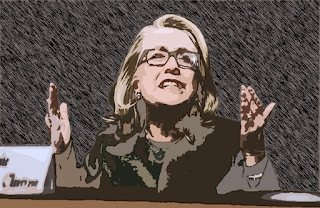Liberals really want you to skip seeing “13 Hours: The Secret Soldiers of Benghazi,” and with good reason.
It’s very existence defies the White House narrative of “phony scandals” and answers back in defiance Hillary Clinton’s screeching whine, “What difference at this point does it make?”
It makes quite a bit of difference, as it turns out, and that’s part of what makes “13 Hours” a great movie. It makes that point without ever trying to. Rather than spending any time finding fault or laying blame, the movie just lays out what happened (ramped up by director Michael Bay’s action aesthetic), and the point comes screaming out from behind the details.
If you’re not mad at your government at the end of “13 Hours,” you weren’t paying attention or you’re one of those people who lives in a state of permanent denial.
It’s always advisable to apply some salt when Hollywood tackles “real” events. But featuring a superb cast, including compelling performances by John Krasinski (Jim in “The Office” TV series) as Jack Silva and James Badge Dale as Tyrone “Rone” Woods (one of the four men killed), the movie is an invaluable illumination of a modern-day event that has been whitewashed by the media at large and highly watchable as a pure action picture. Other notable performances include David Costabile (Gale Boetticher in “Breaking Bad”) as the hapless CIA station chief and David Giuntoli (Nick Burkhardt on “Grimm”) in a supporting role as the ambassador’s bodyguard.
Clinton is not mentioned once in the entire two-hour-24-minute film, and POTUS is only mentioned once in a line about a briefing, but anyone who’s even peripherally aware of politics will hear the former secretary of state, now presidential hopeful, coming through loud and clear. There is one brief mention by one of the characters in the middle of all the mayhem that he’s heard from his family that news reports back home are talking about protests over a video.
And that’s pretty significant.
Told from the viewpoint of people who were there, the lack of support for Americans in the middle of what was a full-scale battle with multiple sorties by the enemy is palpable.
The movie tries to be fair to the higher-ups at the Pentagon and elsewhere, showing scenes at the beginning of the fight of military intelligence personnel scrambling and generals being briefed, with orders being given to “spool up” reaction forces.
But then, nothing. Except for a small evacuation team, no help comes until dawn, and even then it’s a security force of Libyans. “Still no Americans,” one of the team comments.
The absence of the White House and the U.S. military covers the entire series of events like a smothering blanket.
To its credit, the movie doesn’t attempt to explain why things happened the way they did, including the stand-down order that to this day the CIA and White House deny happened but that the people who risked their lives trying to save Ambassador Chris Stevens say they heard with their own ears.
But one thing the movie establishes is that the security situation in Benghazi was known, and it was understood by the personnel stationed there, particularly the potential danger to the ambassador, who insisted on staying in an embassy compound that didn’t even have the standard basic security precautions of other embassies and that relied on protection by mercenary forces.
There is much about the activities of Islamist groups in the area, and the combat action itself as depicted, that suggests the assault first on the embassy outpost and then on the well-known “secret” CIA compound was planned in detail.
Which makes the mention of blame being placed on a nonexistent protest over an Internet video so important. It’s a specific but strangely random explanation for a complex series of events that itself seems to have been well-coordinated but that oddly drew no response from the White House and Pentagon. How that happened and what more may have been behind that cover story is the question Clinton was trying to dodge with her shrieking reply to the congressional hearing.
During her testimony, Clinton said it was less important "why these militants decided they did it than to find them and bring them to justice."
So how's that search going, Hillary? A little like O.J. Simpson's search for the "real killers"?
Why Benghazi happened and why it was covered up is a question that still needs answering, particularly as one of the people at the center of the situation wants to be the next leader of the free world.
“Thirteen Hours” doesn’t ever ask that question. But it demands an answer nonetheless.

No comments:
Post a Comment